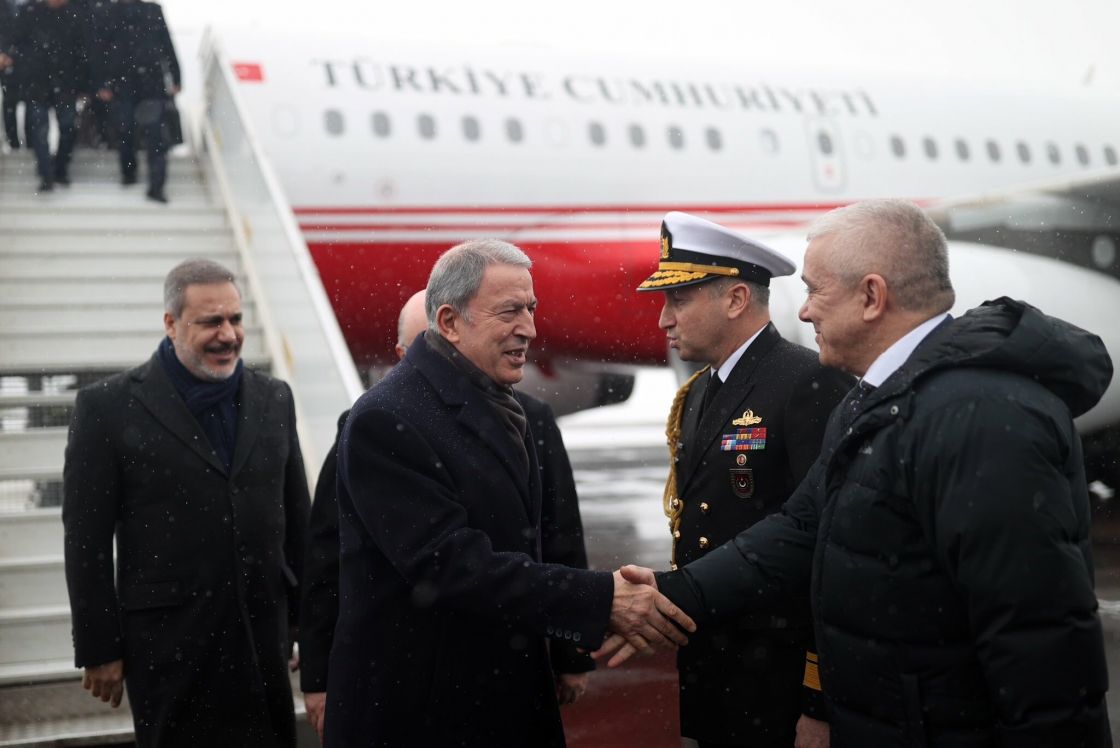- Editorials
- Posted
Kassioun Editorial 1103: The Moscow Meeting, Content and Goal
The tornado of opinions and statements hostile to the Moscow meeting that took place on the 28th of last month, and brought together the defense ministers of Russia, Turkey, and Syria, continues still. While the focus of these views – as has become clear and declared – is the official American position stated by the US State Department, the reverberations of that position have emerged clearly with the extremists in both the opposition and the regime alike.
Opinions hostile to the Moscow meeting are taking two basic forms. The first form – its heroes are the extremists within the opposition – is the blatant and direct attack, which considers the meeting a “betrayal” of Syrians’ blood and sacrifices. The second form, which is sneakier – its heroes are the extremists within the regime – is attacking the meeting by exaggerating the celebration thereof, coupled with devising lies about its contents and meanings, as part of an attempt to mislead the people around it in the hope of pushing them to stand against it, and against what will follow.
The atmosphere among the extremists on both sides in the way they are interacting with the Moscow meeting is similar to that after the adoption of UNSC Resolution 2254 at the end of 2015. At that time, they rejected it, attacked it, and undermined (even accused of treachery) those who agreed to it, only to come back months or years later to recognizing it. Of course, it became clear later that when they recognized it, they were being deceitful, with the aim of working against the political solution from within the halls of the United Nations and within the various frameworks of the political process. This just like how their Western bosses dealt with the Minsk Agreements. For both, the issue was no longer confined to being war lords and profiteers, but rather the real solution to crises has become a threat to their future and existence. Thus, it is not surprising that they will put forth the utmost efforts to work against the solution.
Despite the tornado of attacks, which was ultimately limited, what any objective observer can see is that a significant majority of Syrians view this meeting somewhat cautiously optimistic and hopeful. The source of this optimism and hope is the sound common sense of the general public, who senses – even without conclusive scientific evidence – that this meeting is within the path that leads towards a solution and towards change. Perhaps one of the tools that allow the people to understand this issue is their deep knowledge of the positions of the extremists on both sides, who have always worked against a Syrian-Turkish settlement, openly and secretly. Additionally, the majority of the plundered Syrians have an absolute conviction that their interests are the exact opposite of the interests of the extremists within each of the regime and the opposition.
The content and essence of the Moscow meeting, and the meetings that will follow in the coming period, mainly mean the following:
First: This meeting means that the Astana process has actually moved to the third and final phase of its development. Its first phase was the task of a ceasefire across the de-escalation zones, and the second was to maintain the ceasefire while launching partial initiatives regarding a political solution, as was the case with the Constitutional Committee. The third and final phase, of which the Moscow meeting constitutes its public launching, is to wrest the full initiative in implementing UNSC Resolution 2254 from the hands of the West, which clings to the resolution only verbally for the purpose of preventing its implementation.
Second: A Syrian-Turkish settlement on the basis of the territorial sovereignty and unity of both countries, has become a main gateway to strip the West of one of the most important tools of extortion and sabotage in Syria, that is, economic sanctions and blockade.
Third: A settlement between Syria and Turkey, is a settlement that is very different from the “normalization” processes that the West has and continues to encourage, including with some Arab regimes. The first – i.e., the settlement – constitutes one of the keys to reach the transitional period, that is, the actual implementation of UNSC Resolution 2254; while the second – i.e., the “normalization” – constitutions a tool to perpetuate the fait accompli and the de facto division.
The path will be neither paved not easy, and the extremists will continue their sabotage attempts in all possible ways, including through fake attempts to revive paths that did not and will not provide anything in their current structure. Although it will not be easy, it is the right path towards a solution, and this is what is important in this matter.


